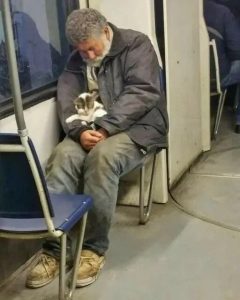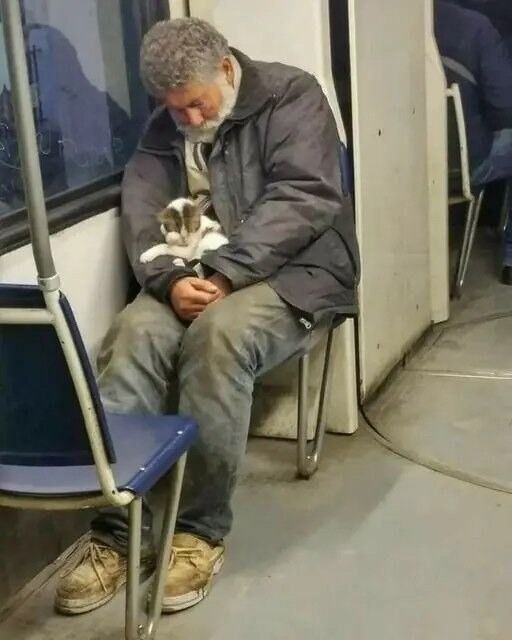Jack walked behind a row of buildings in the city on one of the coldest nights of winter, when even the lights seemed to flicker with doubt, looking for a quiet place to sleep. His breath hung in the air like smoke, and the cold pained every part of him. His coat was torn at the seams and missing a few buttons, so it didn’t do much to block the wind from blowing through the city. This is how he has learnt to stay alive night after night, but it never gets easier. You get used to how horrible it feels.
He heard it while he was walking around the back of a coffee shop that was closed. It was a feeble, fractured sound that didn’t fit in with the sounds of the city. It wasn’t a car or a human. It was weaker and smaller. He stopped, turned his head, and heard it again. The sound was a soft, almost imperceptible meow. Jack was frightened and wanted to know what was going on, so he sat down next to the dumpster and shoved wet cardboard and old papers out of the way until he saw her.

She was a kitten, and her size was about the same as his forearm. She was shaking, moist, and had trouble lifting her head. Her eyes were crusty, her fur was thin and patchy, and she breathed in short, rapid bursts. Her ribs sprang out of her skin like thin twigs, and her body seemed lifeless, as if life itself were melting away.
Jack didn’t think about it. He didn’t think about it. He unzipped his coat, pulled her close, and covered her in the inside fold of his jacket. He held her close to his chest so she could feel how warm he was. “I got you,” he muttered, and then he rocked her back and forth like you would a scared child. He wrapped her up like a secret to keep her warm in the harsh wind.
That night, he didn’t get much sleep. He was always checking to see if she was still alive. He felt strange relief and something more with every little breath she let out. He now felt like he had a purpose.
He named her Hope.
Jack did everything he could to help her during the next few days. He tore off small pieces of the sandwiches people gave him and soaked them in water to make them soft enough for her to eat. He would use a clean plastic cup to catch fresh rainwater and bathe her face and paws with it. As she cuddled up close to him at night, her body shook less and less. Her purrs, which used to be weak and scratchy, got stronger and more regular.
They worked as a team. Jack took care of Hope, and Hope gave Jack something he hadn’t felt in a long time: a connection. She noticed him in a world that didn’t always see him. And most importantly, she needed him.
When he begged for money during the day, Hope would sit on his shoulder or in his coat. People stopped to pet her. A few folks gave him an extra dime. Most individuals just kept going. But she was always there, and her soft fur helped him feel a little better in his otherwise hard and confusing life.
One morning, Ellen observed Jack and Hope sitting on the sidewalk outside a bakery, sharing a piece of bread. She was on her way to work with a cup of coffee in her hand when she saw Jack carefully breaking up crumbs and putting them on a napkin for the kitty that was sitting on his lap. He spoke to her softly, as if they were the only two people in the world. Ellen stopped.
“You take good care of her,” she said.
Jack looked up, shocked that someone was talking to him. “She saved me first,” he added.
She couldn’t get over how he phrased it. She asked him his name and whether he had a place to sleep that night. He was telling the truth when he said he didn’t. Ellen didn’t feel bad for him; she respected him. She could see that they cared about each other. It’s not normal to be that kind, even if you don’t have anything.
She came back later that day, but not with money. Instead, she brought something far more useful: information on a local shelter that supported people who were homeless and didn’t want to leave their pets behind. Jack didn’t believe it, but Ellen’s eyes made him think it was true. Ellen told him that the refuge was safe.
So he went.
The shelter was different. A vet checked at Hope and gave her vaccines and medicine for her diseases. The vet also remarked she was “a little underweight, but tough as nails.” Jack had a nice bed, regular meals, and counselors who didn’t just tell him what to do; they also listened to him. Payed serious attention.
For the first time in years, he didn’t have to sleep with one eye open. He didn’t have to choose between getting food for himself and getting food for Hope. They were safe. All together.
Jack took job readiness training and got support hunting for work during the next few months. He was honest about how he ended himself on the street after losing his job a few times, having a bad landlord, and not having any family to aid him. But he never said anything. He only said, “I was alive.” I want to live right now.
He finally landed a job as a maintenance assistant at a housing development nearby. The job didn’t pay much, but it was steady. With his first few paychecks, he was able to rent a small apartment that allowed dogs. When he picked up the keys and said, “We’re home,” he looked down at Hope, who was curled up in his jacket like she always did.
Hope loves to sit on the windowsill and watch the birds. She is healthy, loves to play, and is very loyal. Jack says she still wakes him up every morning around dawn, meowing for food and head scratches.
Their journey didn’t start out easily or nice; it started out of desperation, in the cold, and to stay alive. But that one small act of kindness, when Jack gave his only warmth to something smaller than him, started everything.
Jack doesn’t see himself as a hero. He says he did what everyone else should have done. But one simple choice to care changed everything.
Even if you don’t have anything, you can still give. And by giving, you could find a reason to live.
